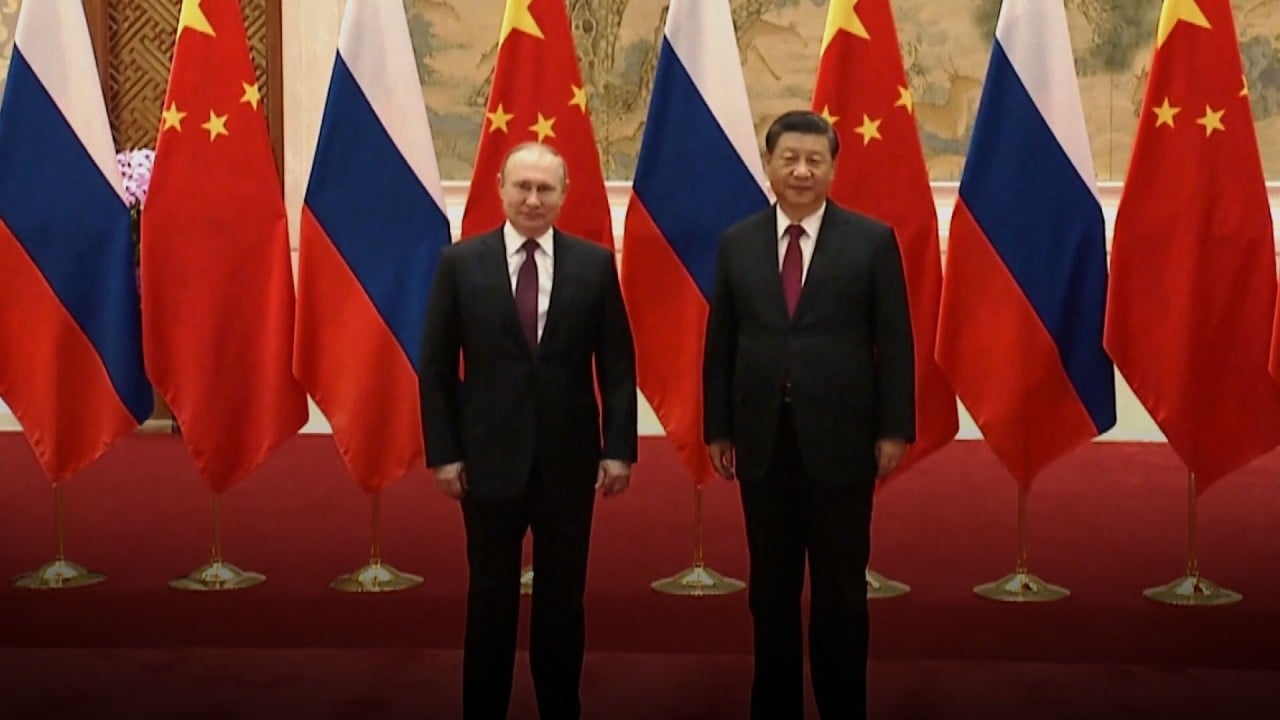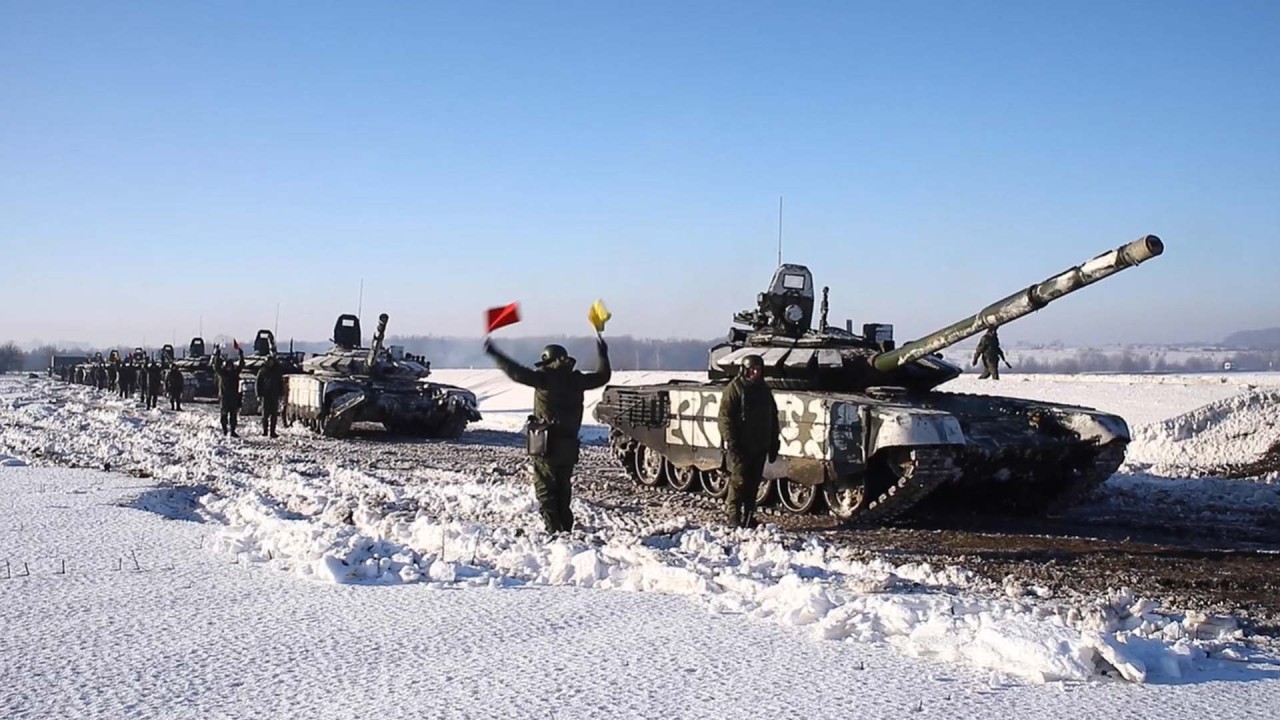
As Ukraine crisis worsens, Europe pushes back against China-Russia efforts to ‘redefine’ post-war order
- European leaders say Beijing and Moscow are working together to undermine democracy, multilateralism and human rights
- The Brussels leadership concedes that previously private warnings from officials and diplomats have substance
A series of speeches over the weekend showed that Brussels’ bigwigs are now saying in public what officials and diplomats have said in private for some time: Beijing and Moscow are working together “like never before” to undermine democracy, multilateralism and human rights.
“The Russia-China joint statement of 4 February is the culmination of a long-standing campaign. It is an act of defiance. It is a clear revisionist manifesto. A manifesto to review the world order,” Josep Borrell, the EU’s foreign policy chief, told the Munich summit on Sunday evening, in his most stinging rebuke of Beijing to date.
European Commission President Ursula von der Leyen said on Saturday that the joint communique was “a blatant attempt to rewrite the rules of our international system”.
“They seek a ‘new era’, as they say, to replace the existing international order. They prefer the rule of the strongest to the rule of law, intimidation instead of self-determination, coercion instead of cooperation. We still hope that peace will prevail and that diplomacy will take us there,” she said.
Borrell, the EU’s top diplomat, is understood to believe China when it says it does not want war in Europe.
The Spanish diplomat Borrell’s baseline position is that Russia thrives on disruption, but China – so hooked up to the global economy – would prefer stability, a common view among western European analysts.
“Some Russian interventions China is in favour of, such as in Kazakhstan where Russia remains the guarantor of security. That suits China perfectly,” said Sven Biscop, a foreign policy professor at Ghent University in Belgium.
“But in those former Soviet republics that have now opted for a Western orientation, if the Russians intervene, they create instability. And from an economic point of view, that doesn’t suit China.”
Nonetheless, Borrell warned that both powers were trying to sway third countries, proposing alternative forms of governance, and waging “a battle about the universality of human rights”.
Xi Jinping calls for diplomatic resolution of Russia-Ukraine dispute
“Redefining democracy is a major plank in their revisionist drive. They talk about ‘genuine democracy’. Adding qualifying adjectives reminds us of Soviet times when communist regimes were talking of ‘people’s democracy’ or ‘organic democracies’ in Franco’s Spain,” Borrell said.
Addressing the same summit by video link on Saturday, Wang said “Ukraine should be a bridge linking the West and the East”, not “the front line in a competition between great powers”.
However, he also backed Russia’s claims that Nato should not be expanding in its backyard. “If Nato keeps expanding eastward, is it conducive to maintaining peace and stability in Europe?”
This mixed messaging has been pored over by European officials, who have been through the jumbo joint statement “with a fine-tooth comb”, officials said.
The result is a toughening in Borrell and von der Leyen’s public rhetoric, in tandem with a darkening of the mood behind-the-scenes towards China in Brussels.
For instance, when the EU launched a new World Trade Organization case against Beijing last week over patent infringements, officials briefing reporters on background spoke of a “power grab” by Beijing on trade issues.
“This is the first step for China to no longer be a follower of global rules, but actually setting global rules,” one official said.
A senior EU source saw the Russia-China communique as a crystallisation of this trend, in which both parties would support the other’s drive to disrupt the established order.
“It has never been said so clearly how much Russia supports the Chinese positioning in the Asia-Pacific space, and it has never been said so clearly how much China shares in Russian positions when it comes to European security,” they said.
A number of EU diplomats issued similar warnings. One suggested the Xi-Putin accord was a “text of historic significance” and accused the EU of being “asleep at the wheel” in the months that preceded it.
“In the future, these words will take on the same historical importance as the words of Churchill from decades before. Europe can no longer close its eyes, for too long nobody was talking about this,” they said.
Xi-Putin summit yields united stand on Taiwan and Nato
A second envoy said that while in planning meetings for Monday’s gathering of EU foreign ministers the focus has been on sanctions and the issues at the Ukraine border, “the read across is clear, it’s there: China, Taiwan, and the geopolitical implications of all of that”.
British Prime Minister Boris Johnson took a similar line when he addressed the Munich summit on Saturday.
“If Ukraine is invaded, the shock will echo around the world, and those echoes will be heard in East Asia – in Taiwan. The risk now is that people would draw the conclusion that aggression pays, and that might is right,” he said.
Former officials said the Ukraine crisis has helped patch up the transatlantic alliance, which was in the doldrums six months ago after France controversially lost a lucrative Australian contract to the United States.
Xi-Putin stand on Ukraine won’t alter Indo-Pacific strategy: US diplomat
China will not be attending when 27 European foreign ministers meet with 30 of their Indo-Pacific counterparts in Paris on Tuesday.
“China would not have been amused if it had been invited because China opposes – wherever it can – the label of ‘Indo-Pacific’,” a senior EU source involved in the planning said.
We will resist: Putin flags united China-Russia front against sanctions
But it will be a prominent topic of discussions, which will take the form of three round tables.
One will be on the EU’s Global Gateway programmes, seen as a rival to China’s Belt and Road Initiative; a second on global issues including climate, biodiversity, oceans and health; and a third on security and defence issues.
The China-Russia relationship is expected to be discussed at the third round table, while EU ministers are expected to agree on a permanent European maritime presence in the Indo-Pacific region at a meeting on Monday.



